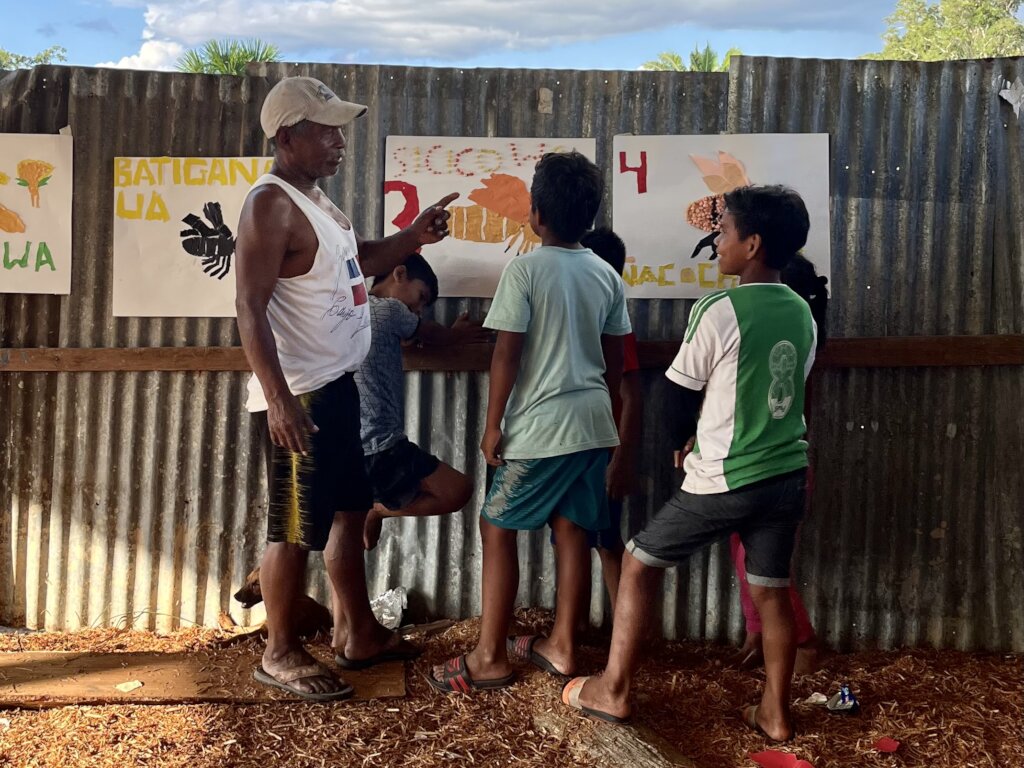By Elizabeth Benson | Project Leader
Maijuna beekeepers are teaching the next generation the cultural importance of bees along with the honey-producing trade!
Seasoned beekeepers are growing as educators and extending their knowledge to young people for the good of the bees, Maijuna culture, and their local economy. Among the strengths of stingless beekeeping as a sustainable complement to Maijuna livelihoods are extensive, long-held cultural practices relating to the bees. Maijuna beekeeping educators have recently been focused on teaching bee ecology and the Maijuna language to youth in their communities.
Maijuna educators began challenging kids to explore the vast diversity of local stingless bees according to their respective names in the Maihiki language. Armed with bug nets and magnifying glasses, kids collected various species of stingless bees to study their anatomy. They then turned to their elders to learn about what distinguishes these bees, be it their nests, behavior, honey, or relationships with people. Beekeeping educators also explained the process of how bees gather nectar and pollen to make honey, while also drawing parallels to their own culture.
Just as bees make honey by processing and fermenting nectar from forest flowers, so too do the Maijuna gather around a favorite drink called masato. Masato is prepared through peoples’ harvest of yuca, followed by collaborative processing and fermentation, ultimately creating a drink that brings people together. Honey is the bee’s masato! Beekeeping educators explored this connection through games and play with kids who otherwise find few opportunities to learn about their cultural traditions. The beekeeping educators see this as part of the endeavor for the cultural and biological conservation of bees while sustainably selling honey.
In addition to helping kids understand the connection between stingless bees and Maijuna culture, our educators are working to strengthen kids’ leadership skills through group work and to nourish creativity, inquiry, and communication skills. Our dynamic workshops were full of educational games, art, and hands-on exploration. After collecting stingless bees, students created collages to represent the bees and presented their findings to their peers. Our work is especially powerful when we can simultaneously support leadership, cultural education, ecological exploration, and economic opportunities in one fell swoop!
Beekeeping educators are leveraging their knowledge of the native stingless bees into a celebration of Maijuna culture and as a sustainable complement to their livelihoods. Witnessing the next generation of Maijuna beekeepers get excited about bee ecology, management, and their own unique culture, signals that beekeeping will be an important part of the Maijuna economy and community for years to come. Your generous donations help us inspire and educate the youngest Maijuna abejeros. We will keep you updated on this evolving story of conservation, empowerment, and economic opportunity!
Project reports on GlobalGiving are posted directly to globalgiving.org by Project Leaders as they are completed, generally every 3-4 months. To protect the integrity of these documents, GlobalGiving does not alter them; therefore you may find some language or formatting issues.
If you donate to this project or have donated to this project, you can receive an email when this project posts a report. You can also subscribe for reports without donating.
Support this important cause by creating a personalized fundraising page.
Start a Fundraiser